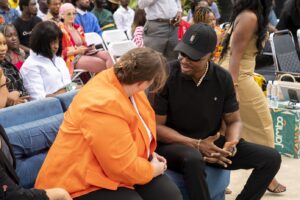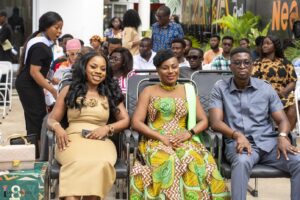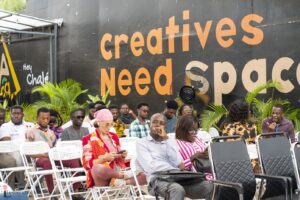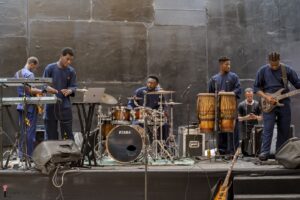The first-ever Create for Pay symposium in Accra, which took place on April 26, 2025, ended with strong demands to enhance intellectual property rights and business prospects for Ghanaian creators.
Hosted by Liando Africa Legal in collaboration with the U.S. Embassy Ghana, Jambo Spaces, and supported by corporate sponsor Black Oak Developers, this gathering brought together more than 250 individuals including artists, legal professionals, music business leaders, and policymakers to tackle systematic hurdles impeding the sector’s development.

From Liando Africa Legal’s central London offices, President Dr. Kwame Nyampong delivered a virtual keynote speech highlighting intellectual property as “the lifeblood of innovation.” He encouraged artists to utilize legal frameworks to convert their creativity into enduring businesses.

“Too often, brilliance is dimmed by a lack of access to knowledge, legal safeguards and markets,” he said, announcing plans for follow-up initiatives to expand support for Ghana’s creative community.
Managing Partner Lilian Geraldo outlined Liando’s mission to bridge gaps in IP literacy, citing immigration hurdles and fragmented regulations as critical challenges.
“Our Entertainment Law Division is dedicated to ensuring creators have ownership, protection, and financial benefits from their innovations,” she said, commending collaborations with entities such as the Copyrights Office, Franklyn and Partners, and Cliqlaw for aiding in the push for these pragmatic changes.
Panels featuring seasoned music business experts, legal representatives, Copyrights Office representatives and the on-site Free Legal Consultation Clinic – jointly manned by legal advisors from Franklyn & Partners and Liando Africa Legal – tackled themes from metadata management to licensing strategies.

In whole, these experts holistically explored digital streaming’s potential, and urged artistes to adopt “enterprise-minded” approaches.
The Blue Jackets Band invigorated the audience with their lively performances, highlighting Ghana’s significant cultural impact. A number of artists, notably the legendary E.L., took to the stage to captivate the crowd with mesmerizing versions of their hit songs.
Judges from Ghana’s higher courts, members of parliament, and law faculty instructors vowed to work together, highlighting similarities between the issues faced by the creative sector and wider judicial improvements as well as the eventual modernization of intellectual property legal practices.

The headline sponsor, Black Oak Developers, reinforced their dedication to corporate social responsibility through a statement from one of their representatives who said, “Nurturing talent networks is not just charity; it’s constructing the nation.” Their support facilitated comprehensive sponsorship for the Free Legal Consultation Clinic, providing tailored intellectual property advice.
The lembaga also teased major upcoming initiatives, including enhanced advocacy for policy overhaul, academic portfolio enrichment at the mainstream Law Faculty Levels, Accelerated IP Registration and Regional Registries, and artiste visa advocacy programmes inspired by the U.S. Embassy’s American Music Mentorship Program (AMMP).
These initiatives seek to simplify cross-border collaborations by tackling visa obstacles and enhancing access to the global marketplace, as pointed out by Lilian Geraldo.
Ghana’s efforts to establish itself as a leading creative center in Western Africa align with broader regional patterns, where countries like Nigeria and Kenya have also seen increases in intellectual property registrations following comparable workshops.
Nonetheless, continuous advancement depends on comprehensive policy reforms and active participation from the private sector—a sentiment reinforced during last year’s Ghana Shipping Summit.
As the AfCFTA integration speeds up, addressing intellectual property inefficiencies might boost Ghana’s soft power and unlock portions of Africa’s $2.4 billion creative economy.
Provided by Syndigate Media Inc. (
Syndigate.informasi
).
